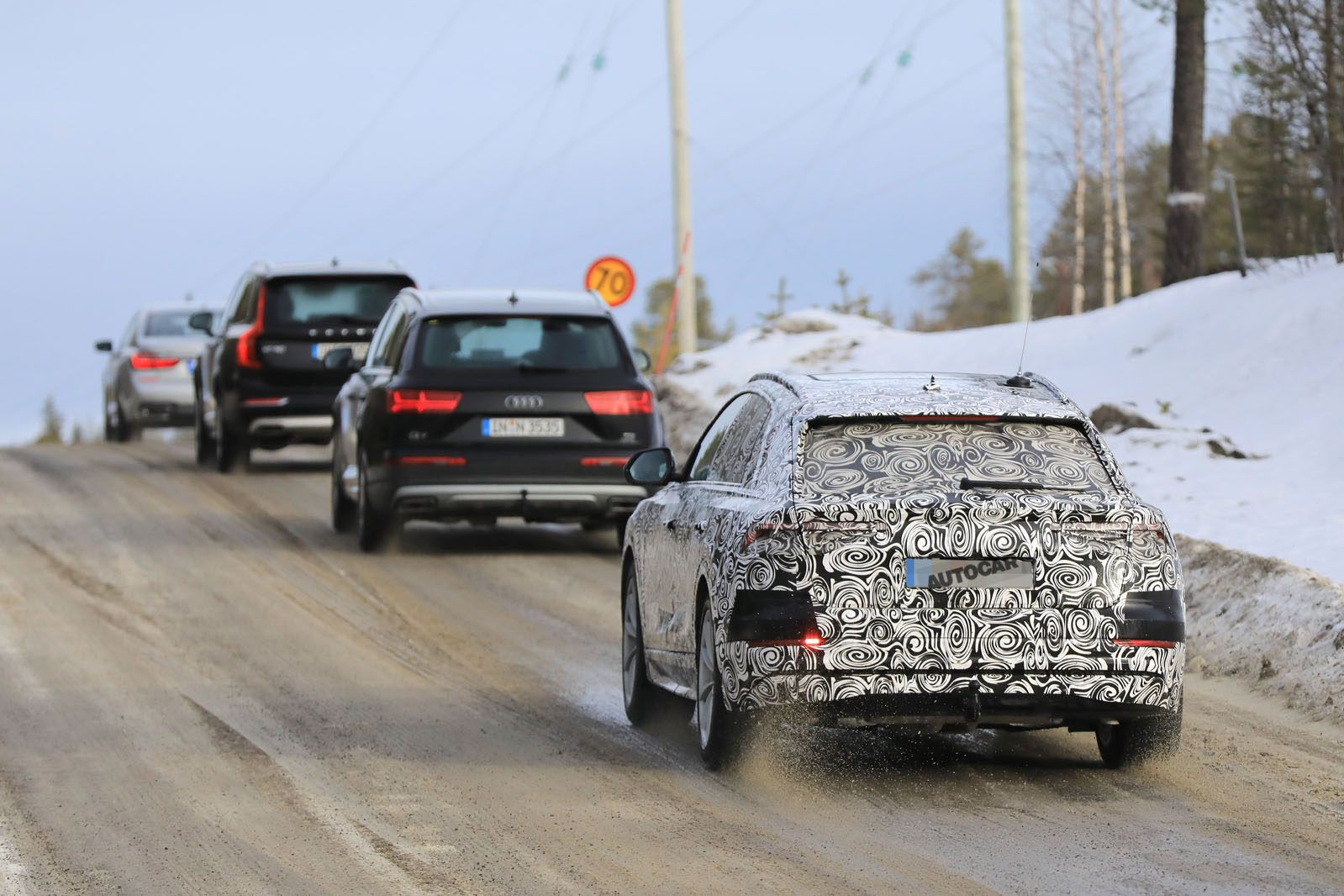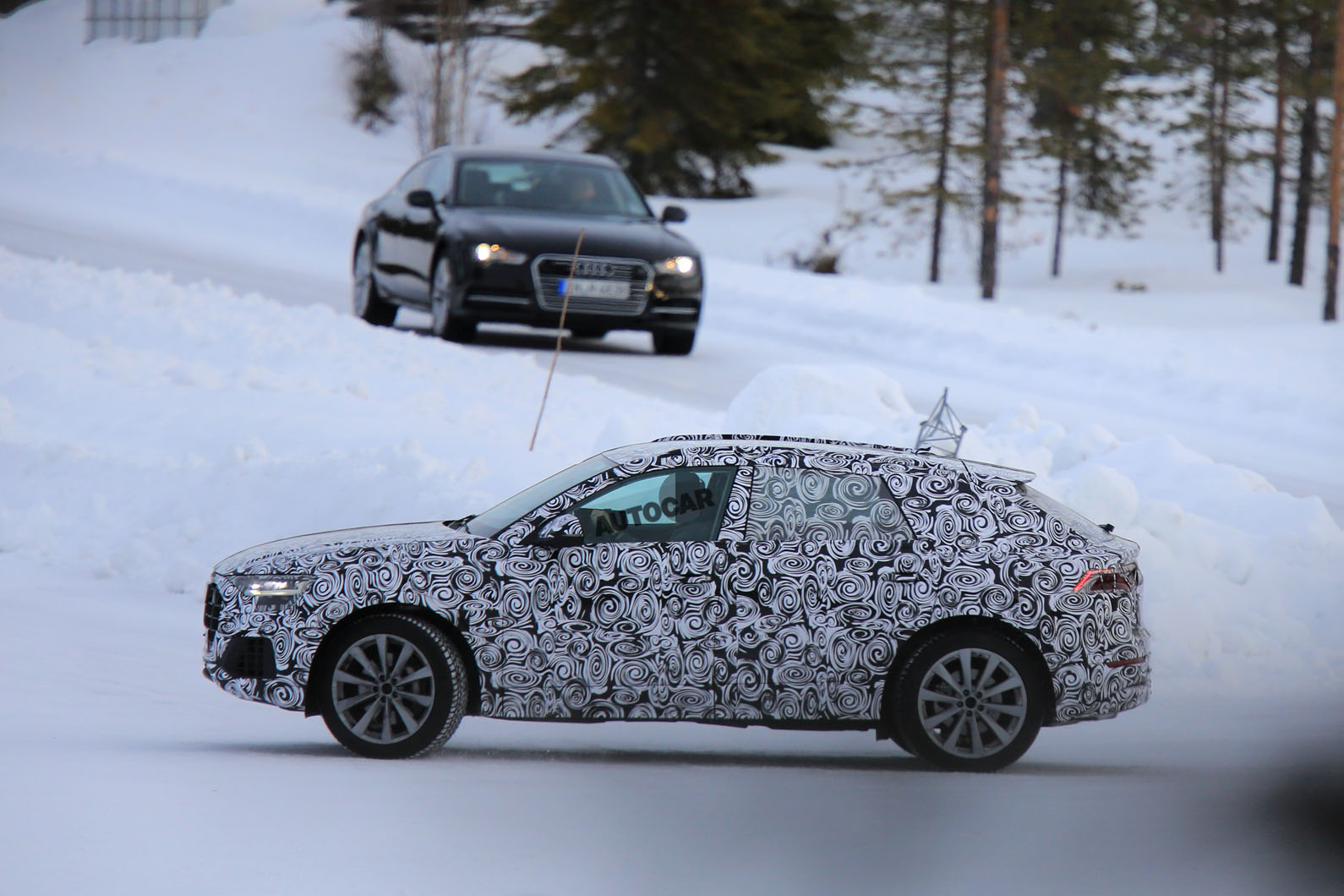The 2018 Audi Q8 has been spotted testing at the Nürburgring, showing how similar the future flagship SUV's design is to the Q8 concept it is based on.
Audi Q8 Sport Concept previews range-topping large SUV
Despite the camouflage, a coupé-like rear roofline and LED headlights and tail-lights can be seen. A broad, eight-corner, single-frame front grille, which houses a series of vertical chrome strips, is also visible.
The model's large size is best illustrated in previous pictures where it is running alongside a Q7, which is the model the Q8 shares much of its mechanical package with.
The final production Q8 will go on sale in 2018 as a rival to the BMW X6 and Range Rover Sport Coupé. It will have an entry-level price of around £55,000 for the cheapest variant.
Audi boss Rupert Stadler has described the Q8 as the firm's "flagship SUV" saying it will sit alongside the A8 at the top of the firm's range. "I could imagine an executive being driven to work every day in their A8 and then spending the weekend driving themselves in their Q8," he said. "The Q8 will have global appeal in all of the major markets - Europe, China, America, Russia and more, so we are very excited about it."
The Q8 is one of seven new SUV models currently under development at Audi and scheduled for launch before the end of the decade. It joins the Q2, updated Q3 and new Q5, a new Q1 and Q4, and the all-electric Q6, which was previewed by the Audi e-tron quattro concept at the 2015 Frankfurt motor show.

Audi's intensive focus on SUV models follows worldwide sales figures that revealed every third car sold by the Ingolstadt brand hails from its existing line-up of Q models.
The new flagship SUV will come with an extended range of petrol, diesel and hybrid powertrains. At the entry level will be a 3.0-litre TDI, while at the top of the range will be a secret new plug-in petrol-electric system. The electrified powertrain is being developed in partnership with Porsche and is claimed to give the Q8 an all-electric range of up to 31 miles.
High-tech options
Among the new Audi's arsenal of options will be many of the advanced systems being developed for the upcoming fourth-generation A8, such as a 48-volt electric system, OLED high-definition digital displays and the very latest in autonomous driving functions.
Stylistically, the Q8 is quite a radical departure from the current Q7. It eschews the upright stance of its sibling for a much more rakish shape developed by Audi design boss Marc Lichte, who outlined his plans for dramatically more sporty design last year.
As with the upcoming Q4 and Q6, the Q8 has a five-door layout, with four conventional front-hinged doors and a large liftback-style tailgate for access to its boot.
Sources privy to an early design model that was revealed to Audi officials last year confirm the Q8 is close to the Q7 in both length and width, at 5050mm and 1970mm respectively.
However, a more sporting roofline reduces the Q8's height by some 50mm over its more practical sibling, at around 1690mm. However, Lichte believes the boot space of the Q8 will still eclipse rivals because the roof line drops dramatically around the C-pillar, meaning space is reduced only at the end of the car's length.

By comparison, Mercedes-Benz's flagship SUV, the GLE, is 4900mm long, 2000mm wide and 1700mm tall, while the Range Rover Sport has respective dimensions of 4850mm, 1985mm and 1780mm - and similar dimension are expected for that car's coupé variant.
Light-weight platform
As with the Q7, the Q8 is based around the latest evolution of Audi's MLB platform, complete with a 2990mm wheelbase.
Reflecting the Q8's more sporting brief, Ingolstadt insiders said it is also in line to receive track widths that extend beyond the Q7's, which are 1680mm at the front and 1690mm at the rear.
As with the Q7, the body structure of the Q8 is set to make extensive use of aluminium in a bid to push lower-end models below the 2000kg mark.
Further weight-saving measures include the selected used of carbonfibre in non-load-bearing structures, as seen on the R8. Among the engines destined for the Q8 will be a new range of V6 and V8 petrol units.
These are currently in the final stages of development in a joint venture between Audi and Porsche that carries the internal codename KoVoMo (derived from the German words 'Konzern Vee Otto Motoren'). They are also set to be used by Bentley and Volkswagen.
The new V6 and V8 are based around a shared 90deg architecture and will feature a common 500cc individual cylinder capacity, suggesting sizes of 3.0 and 4.0-litres.
Due to replace Audi's and Porsche's current V6 and V8 petrol units, the new engines will feature gas-driven turbochargers in the first stage of production.

Hybrid powertrains
Audi insiders have hinted that electric turbocharging, supported by the Q8's 48V electrical system, may also be introduced at a later date.
The KoVoMo engine is claimed to be at the centre of a secret new plug-in petrol-electric hybrid system tipped for introduction on the Q8 and the third-generation Porsche Cayenne.
It is likely to be one of two hybrid systems offered on the new Audi, joining the diesel-electric system already announced for the Q7. Of greater importance to the UK market will be the diesel engine range.
Included among the launch line-up will be at least two variants of Audi's familiar 3.0-litre V6 unit.
A sporty SQ8 model with the advanced triple-turbocharged 4.0-litre V8 diesel recently revealed in the SQ7 is also planned. Inside, the Q8 will receive a reworked version of the Q7's excellent cockpit, featuring a more driver-oriented centre console.
Unlike the seven-seat Q7, though, the Q8 will be available with a five-seat layout only.
As part of a comprehensive connectivity package, Audi is working on providing over-the-air updates for future incarnations of its MMI (Multi Media Interface) infotainment system.
These include real-time navigation updates via the 'Here' system being developed in a joint venture with BMW and Mercedes-Benz's parent company, Daimler.
The Q8 is scheduled to be built at Volkswagen's Bratislava plant in Slovakia alongside the current Q7 and the successor models to the existing second-generation Porsche Cayenne and Volkswagen Touareg, due to be shown this year.
Additional reporting by Jim Holder